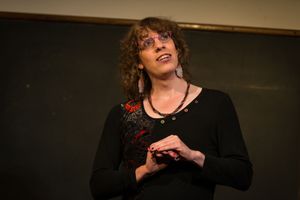
Saltsea Chronicles & Writing the Future
This post is a guest post from one of the excellent writers' room team - Arthur C. Clarke award-winning novelist, poet, performer and game writer Harry Josephine Giles. Read on to find a wonderful perspective on how the story team on Saltsea Chronicles weighed the challenge, responsibility and opportunity of inventing a new world...
How do you write a future?
Sometimes it feels like the end of the world is everywhere. Especially as the devastating effects of climate change begin to be felt around the planet, it’s easy to imagine the cultures we live in coming to a terrible close. It’s no surprise, then, that popular culture is full of stories of apocalypse, from zombie wars to global pandemics, from environmental catastrophe to alien invasion. When we spend so much time thinking about the end, though, we can sometimes forget to think about what comes next.
Saltsea Chronicles is written after an ending. Our game takes place after an extraordinary flood, in communities built in the ruins of what came before. That’s because, for all we might talk about the end of the world, in truth something is always going to survive. When a world ends, another world grows. That’s not to say the end of a world isn’t frightening and real – and many cultures and ecosystems in our own planet have already survived such terrifying ends – but then when we’re facing disaster, it’s also worth telling stories of how we might survive and rebuild something better.
In this post, I’ll talk about some of the ways we built this post-flood world, and the questions we were asking as we wrote it. The stories we tell now, I think, shape how we might respond to disaster in the future – or avert it.
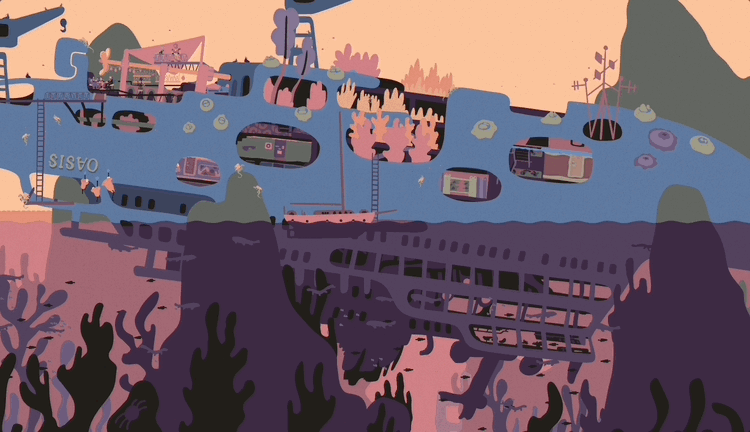
Serious Optimism
Saltsea Chronicles is set in an optimistic future, but also one without illusions. It’s a world where most people have shelter, community and enough to eat, and where systems of exploitation have been taken apart. That doesn’t mean, though, that it’s a world without problems. There are still conflicts between people, people still hurt each other, and communities still face threats that they struggle to work out how to deal with.
To write this, we had to work out how our characters and communities care for each other and meet each other’s needs. We didn’t want to do this by infodumping – introducing long paragraphs of text that explain the world. Instead, a lot of the work happened in the background: we spent weeks working out how food is grown and shared, and how conflicts are resolved, so that when conflicts arose in our story, or when people needed to find food, our worldbuilding could emerge as a natural part of the story.
Similarly, we also didn’t want to suggest that the ethics and ideals of our post-flood communities came out of nowhere, or out of natural goodness. Rather, they needed to be something that our characters had worked for and defended: we talked about where these communities came from. That meant thinking about how our world had survived disaster.
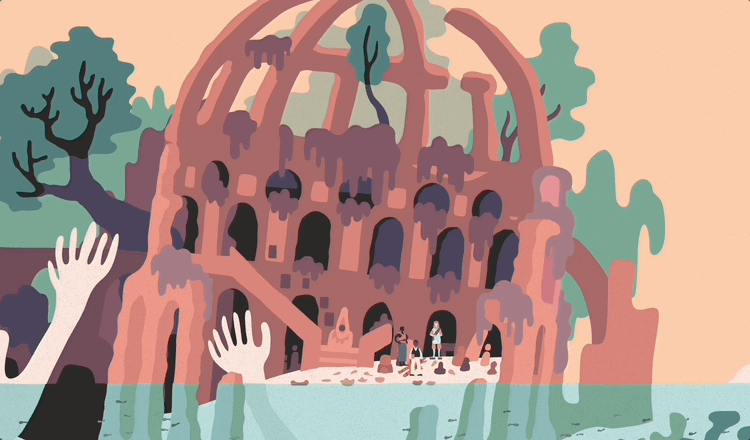
How We Survived
In Saltsea Chronicles, the worst of disaster, the Hard Times, is in the past – but those times still echo in the present. The most important story the communities in our game tell is the story of what it took to survive: they worked together, they shared what they had, and they made sure that no-one would ever do the things that brought about disaster again.
Because these principles were borne of surviving disaster, breaking them would mean inviting disaster again: working out how our communities had survived meant working out how our characters now think. Again, this isn’t something that has to be explained in detail, but something that can be shown through how characters interact. For example, the idea that it’s wrong to keep valuable things to yourself and not share them is so natural and so ubiquitous to our characters’ lives that it becomes a rule in their most popular card game, Spoils: if you hoard, you lose.
Of course, no moral principle is perfect, and sometimes it’s sticking too inflexibly to them, or enforcing a taboo without remembering why it’s a taboo, that becomes a new source of conflict. Communities that have survived disaster, that have been through hard times, carry the pain of that struggle with them, and that hurt – that intergenerational trauma – can be passed on through these conflicts. Part of building our world, then, was asking how our characters hurt, and what they do about it.
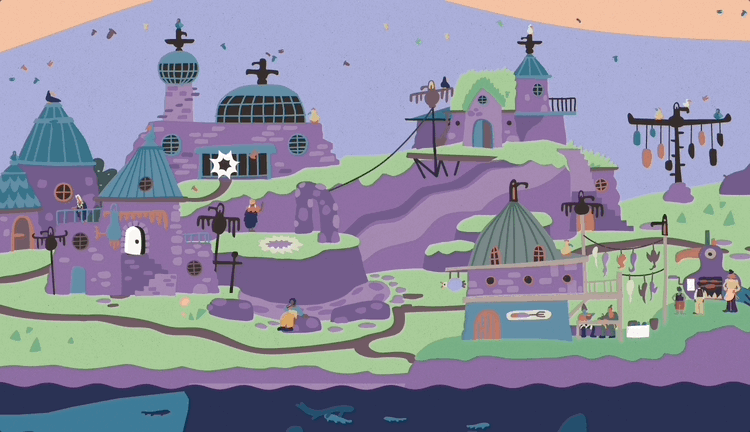
Holding Our Hurts
Our game’s story takes place a few generations after the Hard Times: it’s not in living memory, but rather something our characters’ grandparents’ grandparents remember. Building this kind of timeline helped us work out what different characters’ thoughts and feelings might be, and how they might carry their hurts. Those whose grandparents knew more suffering and deprivation would have been brought up with that living memory, whereas younger characters – and our cast ranges from infants to grandparents! – might feel more distant from that struggle. The conflicts between these characters can generate good stories.
Suffering can be passed down from generation to generation, and breaking that cycle is challenging work for everyone. The islanders of Saltsea Chronicles know this, and they’ve build social structures and institutions to try and break that cycle – but they don’t always work. In the story, you’ll meet islanders who’ve set up safe havens for people who’ve been hurt, and also places of restoration for people who’ve done the hurting. This isn’t a utopia, but it is a place where we can see people working out how to do something better. That’s a story about the future – but then as now, it’s also a story about the past.
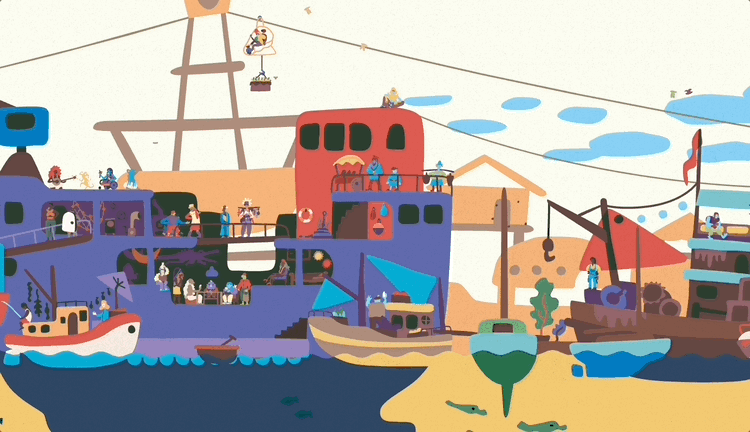
Storying the Past
As we built the history of our world, we did work out what had happened and when: what disaster occurred, how the world changed, and how long it took to rebuild. Hidden in our World Bible – the document that keeps track of all the information about the game – is a deep history of the archipelago, but that’s not a history you’ll ever find directly in the game. If you think about it, you don’t know exactly what the world was like for your grandparents’ grandparents’ grandparents: you might have a rough idea, but the real facts are specialised knowledge, and even then they’re uncertain and debatable, dependent on the quality of written and oral records. In a world where systems of knowledge preservation have broken down, the history of that world becomes more uncertain still. Instead, what our characters have is stories.
All that means that instead of a detailed timeline, what you’ll find in Saltsea Chronicles are different stories of what might have happened to bring about disaster and what it might mean. There are folk memories, traditions, competing theories, partial records, myths, histories and uncertain records. The stories that different characters choose to tell say as much about their feelings and commitments as they do about the world itself. The stories you choose to believe might say something about you, too!
Saltsea Chronicles is a story about a future. It’s brightly-coloured and a little fantastical: it’s not exactly what the future of our own planet will be. It is, though, a story we’ve chosen to tell, because we think by telling it we can shape, in a small way, what our own future will be like, and what stories we’ll tell then.
Wishlist Saltsea Chronicles on Steam now:
